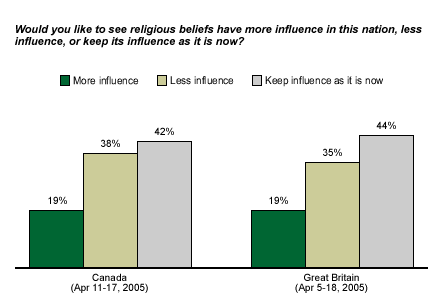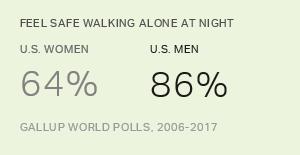The connections among religion, politics, and "values" created an ever-present undercurrent in last year's U.S. presidential election -- but are concerns about where to draw the lines between those concepts characteristically American? Gallup's recent multinational polling tested one aspect of the issue by asking respondents in Great Britain and Canada if religious beliefs should have more or less influence in their societies.
Some of Canada's conservative officeholders have recently been more open about their religious positions than they once were, and British Prime Minister Tony Blair has made no secret of his religious beliefs. But, according to April 2005 Gallup Polls* in both countries, about two in five Britons (44%) and Canadians (42%) are content to keep the current level of influence religious beliefs have in their countries now. Slightly more than a third in each country (35% in Britain and 38% in Canada) would like to see religious beliefs have less influence, and only 19% in each country would prefer to see more religious influence.

The views of Canadians and Britons on this matter are not fundamentally different from those of Americans. In the United States, a plurality says "organized religion" should have the same influence it currently does. As in Canada and Britain, more Americans say religion should have less influence on the nation (33%) than say it should have more influence (26%), though the percentage holding the latter view is higher in the United States than in Canada and Britain.
With roughly twice as many Britons and Canadians opposed to more religious influence in society than in favor of the idea, it's not surprising that British and Canadian politicians are wary of mixing religion and politics. Despite religious opposition to the proposed law legalizing same-sex marriage in Canada, the law passed through the House of Commons, and the Canadian Conservative Party is seeking to downplay the religious attachments of its leaders. Blair rarely, if ever, shows religious considerations in social legislation. These nations' leaders may be increasingly displaying their religious beliefs, but this increase doesn't appear to be influencing their policy decisions.
Views on Religious Influence Cross-Cut Party Allegiance
By and large, those in Canada and Great Britain who would prefer to see more religious influence tend to be older, female, and have less formal education and lower incomes than those who would prefer to see less religious influence. Yet in all these demographic groups, only those who were ages 50 or older in Britain (especially older women), and those in Britain earning less than £10,000 or who are not employed actually had a net preference for more religious influence rather than less. In Canada, culturally distinct French and English speakers showed virtually no difference in their views on whether religious beliefs should have more or less influence on the country.
Dissatisfaction and Religious Influence
In both Canada and Great Britain, attitudes on religious influence differ according to how satisfied people are with the way things are going overall in their country. About half (48% in Canada and 52% in Great Britain) of those who are satisfied with their country are happy to keep religious influence as it is now. But among people those who are dissatisfied with the way things are going overall, only 37% would like to see religious influence remain the same. Both the proportions who want to see more religious influence and the proportion who want to see less influence increase among Canadians and Britons who are dissatisfied with the way things are going in their country today.
*Results in Canada are based on telephone interviews with 1,006 national adults, aged 18 and older, conducted April 11-17, 2005. For results based on the total sample of national adults, one can say with 95% confidence that the maximum margin of sampling error is ±3 percentage points. The survey was conducted by Gallup Canada.
Results in Great Britain are based on telephone interviews with 1,012 national adults, aged 18 and older, conducted April 5-18, 2005. For results based on the total sample of national adults, one can say with 95% confidence that the maximum margin of sampling error is ±3 percentage points. The survey was conducted by Gallup UK.
Results in the United States are based on telephone interviews with 1,005 national adults, aged 18 and older, conducted Jan. 3-5, 2005. For results based on the total sample of national adults, one can say with 95% confidence that the maximum margin of sampling error is ±3 percentage points.
